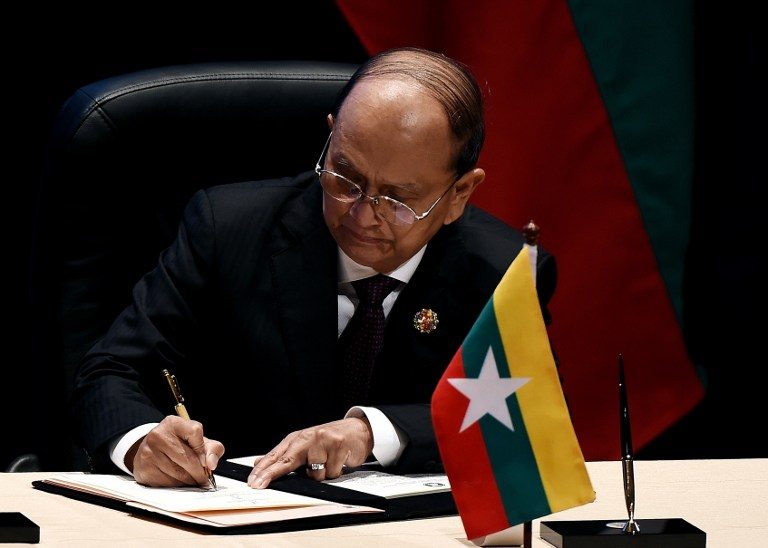SUMMARY
This is AI generated summarization, which may have errors. For context, always refer to the full article.

NAYPYIDAW, Myanmar – When he became Myanmar’s leader 5 years ago Thein Sein was dismissed as a junta stooge – but as he prepares to hand power to Aung San Suu Kyi’s government, the taciturn ex-general can also claim credit for steering a peaceful political transition that has stunned the world.
President Thein Sein, who spent almost half a century climbing the military’s ranks, will make way on Wednesday, March 30, for Suu Kyi’s National League for Democracy and her proxy president Htin Kyaw.
They will form the Southeast Asian nation’s first elected civilian government in generations, marking an extraordinary new chapter for a society suffocated for decades by military rule.
Bespectacled, balding and unobtrusive, Thein Sein’s quasi-civilian regime presided over sweeping reforms that pushed further than many in the country of 51 million people had dared to dream possible.
But the 70-year-old’s record is far from pristine in a nation where the military maintains significant political and economic power and grievances run deep.
Historic elections last year were the first chance in decades for Myanmar’s long-suffering population to choose their own rulers – and Suu Kyi’s party won in a landslide.
Yet Myanmar’s people remain cautious.
“People hoped for more changes, but they (the army) just changed their uniforms,” said Yi Yi, a 59-year-old legal advocate in Yangon.
Unlikely reformer
Seen as absolutely loyal to junta senior general Than Shwe, little dramatic change was expected from Thein Sein when he was named president in March 2011.
Independent analyst Richard Horsey said he was “a little bit grey” to begin with and many just assumed he was a yes man for the former strongman.
“I think people were very surprised when that wasn’t necessarily the case,” he told Agence France-Presse.
As reformers and hardliners tussled for position in his government, senior figures approached Thein Sein and urged real change, convincing him “to come off the fence,” Horsey added.
Within months Thein Sein broke with the old military approach, holding his first meeting with Suu Kyi and abruptly suspending a multi-billion dollar Chinese-backed dam in northern Kachin state – a rare push back against the influential neighbor.
His government freed hundreds of political prisoners, lifted stifling censorship, and launched a dialogue with multiple armed ethnic groups who have spent years fighting for greater autonomy.
Reforms were rewarded with the lifting of most Western sanctions, sparking a flood of foreign investment to the poor nation.
The secretive men in green have never publicly revealed the exact motivation for the dramatic changes.
But observers say the junta recognized the country’s beleaguered position compared to its neighbors, its over-reliance on China and the military’s precipitous fall in the estimations of Myanmar’s people after several mass uprisings.
Old habits
A son of farmers, born in a small village in the southern Irrawaddy Delta, Thein Sein attended a prestigious military academy and eventually climbed to the top echelons of the junta.
Thein Sein never fully stepped outside the military that moulded him.
He emerged as a crucial force behind Myanmar’s roadmap for “disciplined democracy” and a constitution that gifts the army a quarter of parliament’s seats and control over three key security ministries.
The charter also blocks Suu Kyi from the presidency because her sons are British.
There have been other pointers that Thein Sein’s administration was unwilling to abandon the repressive, acquisitive instincts of the junta years.
Scores of protesters have been arrested under his watch, while those in power have been accused of overseeing a rise in Buddhist nationalism.
Many close to the military have been the first in line to rake in benefits from reforms.
In its last days in power the outgoing government has been accused of rushing through opaque business deals.
His legacy may be imperfect, but Thein Sein will be remembered for a central role in the country’s gradual emergence from its dark dictatorial past.
The onus is now on Suu Kyi and her government, which has inherited big issues – including civil wars, religious tensions and eviscerated public services – as well as soaring expectations of change.
“It’s not just impatience among the people, I think the country needs results pretty fast otherwise things could unravel,” Khin Zaw Win, a political analyst, told Agence France-Presse. – Kelly Macnamara and Phyo Hein Kyaw, AFP / Rappler.com
Add a comment
How does this make you feel?





There are no comments yet. Add your comment to start the conversation.